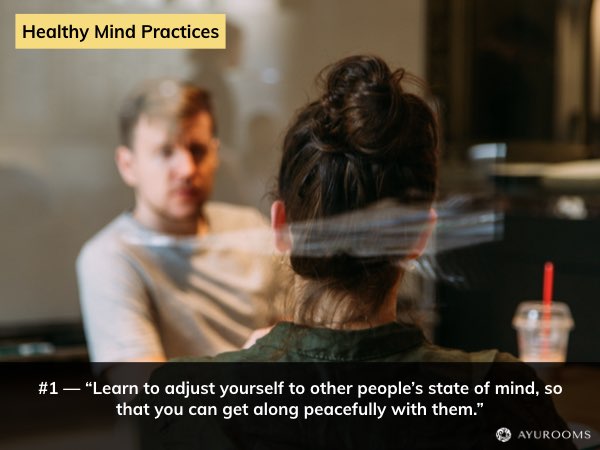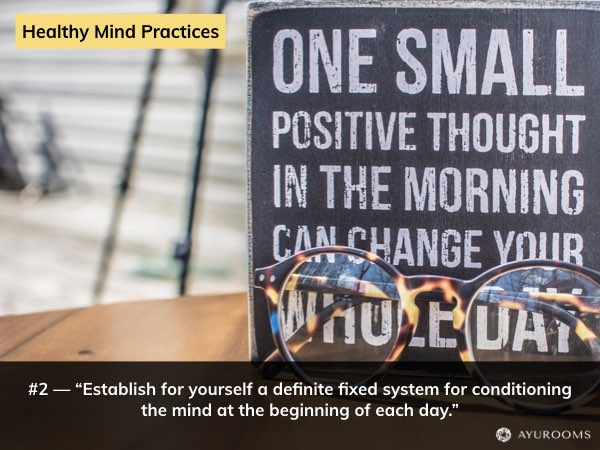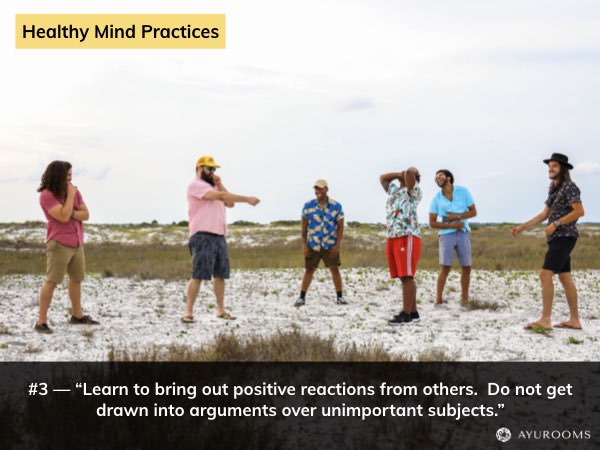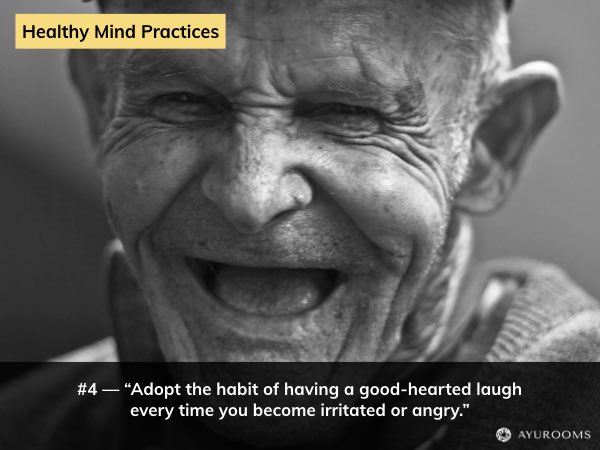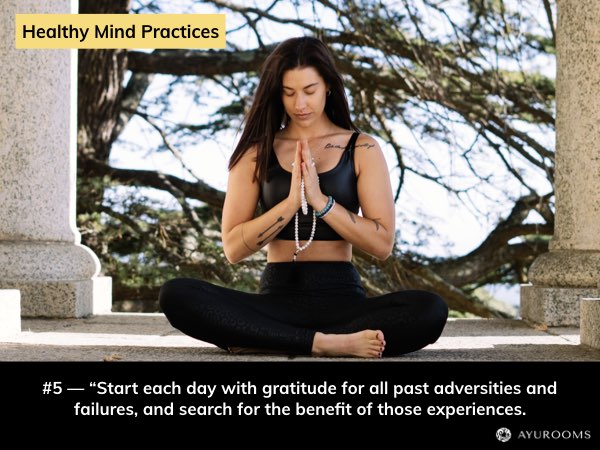In his book The Law of Success (1928), Napoleon Hill offers invaluable tips, techniques and suggestions on how to stay positive during times of adversity. And although the book was written over 90 years ago, the habits and behaviours recommended by Mr. Hill remain relevant, timely, appropriate, practical and practicable today, especially during this time of unprecedented global uncertainty and widespread misery.
During the current lockdown in India, I have observed my mind oscillating between rueful pessimism and wishful optimism – and why not? If my mind feeds primarily on social media and the “breaking news”, then we can expect the mind to be as volatile as the stock market. So I returned to the gardens of the learned – my library of great books – and tried to excavate a few pearls of wisdom that could help me maintain a positive mindset during lockdown.
Here are a few timeless practices and habits of mind suggested by Napoleon Hill, and a discourse on how these might be applied to our everyday lives, under the present-day scenario.
Practice #1 – “Learn to adjust yourself to other people’s state of mind, so that you can get along peacefully with them”.
This particular practice, according to Mr. Hill, involves not being drawn into controversy and not arguing over trivial things, whether publicly or within our families.
Publicly, it can be observed that so many people are arguing about so many things related to COVID-19, including social distancing, politics, leadership, health care, lockdown policies, mass migrations, vaccines, bailouts, stimulus plans and the economy. Some of these subjects are indeed important, but it is perhaps more important to ask oneself: Is my participation in public debate necessary at this time? Will sharing my opinions draw me into argument or controversy, and thereby increase or decrease my peace and happiness?
Napoleon Hill points out that “great people” avoid being drawn into controversy whenever and wherever possible. While participating in controversy and public argument may provide a certain amount of intellectual stimulation and “egoic juice” – i.e. an artificial and temporary boost of self-esteem – arguments and controversy can also be very disturbing to one’s emotional state and mental attitude. Therefore, opting not to participate in controversial opinion about COVID-19 may be one way of keeping a positive mental attitude at a time when it is most needed.
During the current lockdown in India, I have observed my mind oscillating between rueful pessimism and wishful optimism – and why not? If my mind feeds primarily on social media and the “breaking news”, then we can expect the mind to be as volatile as the stock market. So I returned to the gardens of the learned – my library of great books – and tried to excavate a few pearls of wisdom that could help me maintain a positive mindset during lockdown.
Here are a few timeless practices and habits of mind suggested by Napoleon Hill, and a discourse on how these might be applied to our everyday lives, under the present-day scenario.
Practice #1 – “Learn to adjust yourself to other people’s state of mind, so that you can get along peacefully with them”.
This particular practice, according to Mr. Hill, involves not being drawn into controversy and not arguing over trivial things, whether publicly or within our families.
Publicly, it can be observed that so many people are arguing about so many things related to COVID-19, including social distancing, politics, leadership, health care, lockdown policies, mass migrations, vaccines, bailouts, stimulus plans and the economy. Some of these subjects are indeed important, but it is perhaps more important to ask oneself: Is my participation in public debate necessary at this time? Will sharing my opinions draw me into argument or controversy, and thereby increase or decrease my peace and happiness?
Napoleon Hill points out that “great people” avoid being drawn into controversy whenever and wherever possible. While participating in controversy and public argument may provide a certain amount of intellectual stimulation and “egoic juice” – i.e. an artificial and temporary boost of self-esteem – arguments and controversy can also be very disturbing to one’s emotional state and mental attitude. Therefore, opting not to participate in controversial opinion about COVID-19 may be one way of keeping a positive mental attitude at a time when it is most needed.
Within our families, now more than ever, we need attitudes and behaviours that will enable peace and unity to thrive rather than arguments, breakdowns, shouting matches and selfish individualism. We need to understand that each member of our family is processing the lockdown in different ways. Their true mental state is mostly invisible to us. Their anxieties, their fears, their anger, their frustrations, their finances, their stock market portfolios and their wider concerns are mostly invisible to us. Consider that what is visible is less than 20%, and what is invisible is 80% or more. Everyone is highly sensitive at this time.
So rather than get upset about the usual things that go wrong in our households and rather than fight with our siblings and spouses about the same old things, it’s time to let go. It’s time to just live and let live because we’re under lockdown and we need to get through this together. It will be easier to get through the lockdown in an environment of familial and household peace.
Consider this also: the possibility and probability of external peace can be greatly enhanced if each member of each household makes a concerted effort to cultivate peaceful thoughts as well as non-violent communications. Simply put, if we want peace in the house, we need to change our inner and outer dialogue to words of peace. Peace towards oneself and peace towards others. The alternative is internal strife, mayhem and madness in our household, mirroring the world we are seeing externally.
Of course, all of this is easier said than done. And when my girlfriend reads this blog, she will be the first one to point out my inability to practice what I preach. But like Al Pacino said in The Godfather Part II, “We are all part of the same hypocrisy, but never think it applies only to my family.” I accept that I am not always able to practice what I preach, but nonetheless we must have ideals and strive towards them. The capacity to see and accept one’s own hypocrisy is the beginning of its diminishment. In other words, it is the light of self-awareness that grows stronger every time it is shone upon on one’s own flaws of character.
Practice #2 – “Establish for yourself a definite fixed system for conditioning the mind at the beginning of each day, so that you will keep it positive under all circumstances.”
Given that I have been reading The Law of Success Revisited and not the original version, there is no specific guidance offered by Napoleon Hill on what he means by a “definite fixed system of conditioning the mind”. Perhaps one of the reasons for this is that it is up to each individual to develop a fixed system, a fixed daily routine, that will enable you to start your day with a positive mental attitude. This might be a daily morning yoga practice. It might be making a fresh juice or smoothie each morning from fruits and vegetables. It might mean listening to motivational talks by Steve Harvey, Les Brown, Dr Myles Munroe or other inspirational personalities. It might be going for a walk or run, or doing some gardening.
Basically, each one of us needs to find our own form of meditation in the morning, whether it is formal meditation or prayer, or whether it is some form of physical activity. The basic premise is that we need a routine, a fixed practice that places our mind in a state of positivity, optimism, hope and confidence – at the start of each day.
Practice #3 – “Learn the art of selling yourself to other people by asking leading questions that bring out the sort of reactions from others that you desire. Do not permit yourself to be drawn into arguments over unimportant subjects.”
In today’s world of shorthand communications, rampant email, ubiquitous spam, and addictive forwards – facilitated by WhatsApp and various other direct messaging platforms – it's becoming harder and harder to engage meaningfully with people. We leave messages and emails unopened for days, weeks, even years. We ignore messages. We ignore emails. There is just too much other “important” content to consume on the Internet.
In today’s world of shorthand communications, rampant email, ubiquitous spam, and addictive forwards – facilitated by WhatsApp and various other direct messaging platforms – it's becoming harder and harder to engage meaningfully with people. We leave messages and emails unopened for days, weeks, even years. We ignore messages. We ignore emails. There is just too much other “important” content to consume on the Internet.
However, many of us are finding that we also want to have more meaningful conversations, but how to do this in the world of today? I honestly don’t have the answers. But I do believe that avoiding argument over unimportant subjects may open-up avenues towards healthier conversations. Picking-up the phone might also help rather than just sending emails and WhatsApp forwards.
Practice #4 – “Adopt the habit of having a good-hearted laugh every time you become irritated or angry.”
This practice is very hard to implement in reality. I get irritated and frustrated every single day, usually in the evening when I am most tired. Going outside or going to another room in the house and laughing about my anger or frustrations hardly seems like a logical practice. It’s weird at best. However, this is precisely what we must do according to Napoleon Hill.
Practice #4 – “Adopt the habit of having a good-hearted laugh every time you become irritated or angry.”
This practice is very hard to implement in reality. I get irritated and frustrated every single day, usually in the evening when I am most tired. Going outside or going to another room in the house and laughing about my anger or frustrations hardly seems like a logical practice. It’s weird at best. However, this is precisely what we must do according to Napoleon Hill.
The act of observing one’s anger and frustrations and then moving oneself to a private environment to have a hearty laugh at oneself “changes the chemistry of the brain”, asserts Mr. Hill. He says that when you are angry, “get out of sight”. Go somewhere private and have a good laugh at yourself. This will enable us to start each day with a positive mental attitude.
Practice #5 – “Start each day with an expression of gratitude for all the adversities, defeats, and failures you have experienced in the past and search for the seed of an equivalent benefit that these experiences yielded through the passing of time. Then give thanks for the blessings you expect to receive during the day.”
When I read the above quote by Napoleon Hill, I am reminded of the stock market crash in March 2000 and how I lost over $400,000 in three days. I was 22 years old, riding high and mighty, cocky as ever, with around $500,000 between my various bank accounts and portfolios. Then the crash came during the midst of my exams. I was blind-sighted. I didn’t know what hit me and what to do about it. I couldn’t understand what Gordon Gecko meant when he said, “Never get emotional about stocks.” All I could do was be emotional and irrational.
Looking back on previous crashes, I feel an enormous sense of gratitude for having gone through those experiences because I grew through each one: spiritually, intellectually, academically, and even in terms of career. To elaborate on how each crash brought me so many future blessings and learnings would require several more articles, perhaps even a book.
Sufficient it is to say that I got through the enormous pain and hurt of having lost all my money in the stock market, while I was still a kid. Today, I do not get emotional about stocks, at all. Yes, I still trade, but there is no emotional attachment to the outcomes of my trades. Of course, I am in the privileged position of having chosen a career that does not depend on day-trading, but like most other businesses in the world, mine too has been severely impacted by COVID-19. Fortunately, however, both history and a strong sense of faith are helping me to find meaning and lessons in periods of great distress.
In short, “applied faith”, as Napoleon Hill calls it, contributes to the cultivation a positive mindset.
Practice #5 – “Start each day with an expression of gratitude for all the adversities, defeats, and failures you have experienced in the past and search for the seed of an equivalent benefit that these experiences yielded through the passing of time. Then give thanks for the blessings you expect to receive during the day.”
When I read the above quote by Napoleon Hill, I am reminded of the stock market crash in March 2000 and how I lost over $400,000 in three days. I was 22 years old, riding high and mighty, cocky as ever, with around $500,000 between my various bank accounts and portfolios. Then the crash came during the midst of my exams. I was blind-sighted. I didn’t know what hit me and what to do about it. I couldn’t understand what Gordon Gecko meant when he said, “Never get emotional about stocks.” All I could do was be emotional and irrational.
Looking back on previous crashes, I feel an enormous sense of gratitude for having gone through those experiences because I grew through each one: spiritually, intellectually, academically, and even in terms of career. To elaborate on how each crash brought me so many future blessings and learnings would require several more articles, perhaps even a book.
Sufficient it is to say that I got through the enormous pain and hurt of having lost all my money in the stock market, while I was still a kid. Today, I do not get emotional about stocks, at all. Yes, I still trade, but there is no emotional attachment to the outcomes of my trades. Of course, I am in the privileged position of having chosen a career that does not depend on day-trading, but like most other businesses in the world, mine too has been severely impacted by COVID-19. Fortunately, however, both history and a strong sense of faith are helping me to find meaning and lessons in periods of great distress.
In short, “applied faith”, as Napoleon Hill calls it, contributes to the cultivation a positive mindset.
Now you might ask: Why is it necessary to practice positivity? Why is it necessary to interpret the world’s problems positively and constructively? And why should I not argue with my friends and others when they are simply wrong?
I will let Napoleon Hill answer us: “A positive mental attitude can clear away all obstacles that stand in the way between you and your major purpose in life.”
At the end of the day, during this time of unprecedented lockdowns and global confusion, we have a unique occasion and privileged opportunity to think about our gifts, our blessings, and, most importantly, our major purpose in life. To find our major purpose in life, Napoleon Hill insists that each individual must take possession of his or her own mind. One way to do this is to develop habits that lead to a positive mental attitude. In the above discussion, I have covered only five practices. More to follow in due course.
Stay safe and stay positive.
I will let Napoleon Hill answer us: “A positive mental attitude can clear away all obstacles that stand in the way between you and your major purpose in life.”
At the end of the day, during this time of unprecedented lockdowns and global confusion, we have a unique occasion and privileged opportunity to think about our gifts, our blessings, and, most importantly, our major purpose in life. To find our major purpose in life, Napoleon Hill insists that each individual must take possession of his or her own mind. One way to do this is to develop habits that lead to a positive mental attitude. In the above discussion, I have covered only five practices. More to follow in due course.
Stay safe and stay positive.

